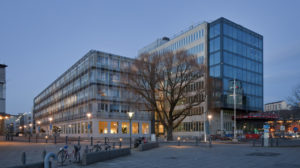Gothenburg, a friendly city

I moved to Gothenburg in 1992 to study at the university here, one of the largest ones in Sweden with almost 50,000 students. It’s also home to some really large multinational companies.
I had little knowledge about the city I’d chosen to move to. I should’ve known there was something special about this place. It’s a uniquely friendly city.
Allow me to explain why. I hope to be able to welcome you in person soon, to show you just how deserved this honorary title is.
The 1990s – Sweden’s friendliest Swedish city, year after year
Back then, the Swedish tourist office conducted annual surveys of cities in this country and year after year, Gothenburg was considered the most friendly one. Why? With regards to other Swedes, I believe it has to do with our language (or dialect if you prefer). The local accent is considered “friendly” and “welcoming”, funny even. To make a finer point, when Disney and other filmmakers dub their movies into Swedish, the comic relief characters always speak our dialect, while the villains are from the north or south and the heroes from the capital region. This is annoying and extremely stereotyping, but that’s how we are perceived: funny and well, funny is friendly, right? Gothenburg humor is also a bit of a national treasure. We have this weird tradition to name our buildings with double-entendre names, often including a pun.

E.g. we call the HQ of our local electricity company “Elysée palace”, a pun for how expensive it was to build, comparing it to the French presidential residence. However, “el-lyse” is also Swedish for electric light. A classic Gothenburg pun.
Gothenburg is an open, welcoming city

We have always been a city built by immigrants, from the very beginning, when German, Scottish, and Dutch engineers dug the trenches into the moor that was on site where the city stands, they poled the entire old city to make sure the houses don’t sink into the clay underneath. This wasn’t the ideal place to build a city, and we still pay a high price for everything that needs digging, because of the clay.
Therefore, we have always had an open attitude toward visitors, immigrants. Yes, we also have fringe elements that are extremely xenophobic and racist (they are – sadly – the proof of just how welcoming the rest of us are.)
In poll after poll, Gothenburg scores as a welcoming, friendly city

This week, I read another article, this time in the UK’s Independent about Gothenburg topping a list of thirty-nine cities around the world, beating such iconic cities as New York, Chicago, Berlin, Vancouver, Sydney, and Rome. How is it possible that a city of roughly 550,000 inhabitants can beat such great cities?
I think our size is part of it. We still see tourists, visitors, and while we wait for a tram or a ferry, we strike up a conversation. We still care, and we’re curious. Not to mention that we are proud of our city, and wish to share it with the world. Unlike many large metropolitan areas where tourists are seen as a nuisance, clogging metros and buses etc.
A friendly city is also one where the pulse isn’t beating too quickly, where the pace of the city isn’t stressing visitors who’re simply taking a stroll. We have tons of cafés and great restaurants where you can enjoy great coffee, cakes, or enjoy the freshest seafood available.


